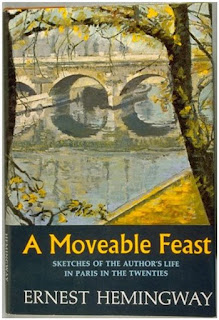A Moveable Feast
To write thoughts on a book such as this is to court disaster. Hemingway may be in or out of fashion, but there is not a sentence out of place in A Moveable Feast and this makes the reviewer incredibly self-conscious – as if Hemingway’s ghost sits alongside and suggests, gruffly, ‘all you have to do is write one true sentence. Write the truest sentence that you know’ (p.12). Well, here it is: the only disappointing thing about this book is that I have damaged it by leaving a wet towel on top, travelling back from the pool in Nyons in France to the house in Piégon where I write this review.
A Moveable Feast
takes its name from the epigraph, and the idea that ends the book, that ‘there
is never any ending to Paris’ (p.182). It opens, literally, mid-sentence to
provide an early, subtle suggestion of this cycle of
eating/feasting/drinking/writing/living: ‘Then there was the bad weather’
(p.3). Hemingway’s memoirs, fiction and fact, were written towards the end of
his life, but are all about the twenties, when he was in his twenties, and
struggling to make ends meet as a writer who has given up journalism to write
short stories and a novel (in the course of the time of A Moveable Feast, he
completes the first draft of “The Sun Also Rises”). There are, I think, three
main joys to the book (or I have categorised for the sake of
Hemingway-brevity).
The first is not my first, but the first of others (one
assumes from the blurb at the back) – and that is, the portraits of now famous
writers that Hemingway knew in Paris at this time. There is a glimpse of Joyce
– dining in more expensive restaurants than the young writer could afford. Of
greater importance is the insight into the life of Gertrude Stein and her
partner, who explained to Hemingway that she ‘always talked to the wives’
(p.13), leaving the two writers to battle-it-out in the world of ideas and
fiction. Hemingway paints himself, largely, as a polite sort of fellow who kept
at least quite a bit of his inner-savage to himself; nevertheless his
description of a pleading Stein with her partner, which he cannot tolerate to
listen to, says enough. Much more developed, and equally damning but also
written with obvious tenderness is his recollection of F Scott Fitzgerald and
Zelda. Fitzgerald is already a drunk, and a sort of rich American who lacks
appreciation of the French he encounters (such as waiters, who Hemingway gets
to know and respects); Zelda is well on the way to madness and self-destruction
– and yet on reading The Great Gatsby,
Hemingway knows he must join the list of Fitzgerald’s many friends, to help him
in any way he can.
Writing, for Fitzgerald, is difficult because of the
temptations to drink and a wife who Hemingway sees as jealous of his writing. For
Hemingway himself, the book portrays the sort of craftsman’s discipline and
habits that allow for words to appear on the page, sentence-by-sentence. The
second attraction of the book is thus the insight it gives into the confessions
of a writer, about his own craft and how he manages it with the balance of
family, and living, something which I think is of real interest in the book.
That is to say, A
Moveable Feast is no portrait of hedonism or luxury, nor does it portray
abject poverty and suffering. There is something like chipped nostalgia here
(apologies for the adjective) with the richness of daily life and the small
pleasures of eating, drinking, loving and living celebrated. Thus is it is
fitting that the last chapter, the one that leads to the final comment about
never leaving Paris, is all about skiing in Austria, and not just about skiing
but the earnest climbs up the mountains required to ski down which means that
the skier is as ‘true’ as the writer: his legs are strong enough and he is wary
and not foolish of avalanches and other mountain dangers. Fitzgerald also draws
the memoir to a close by letting the reader know that there are shadows on the
horizon, with an affair beginning while his wife still loves him. Thus the last
lines, even without knowledge of Hemingway’s own tragic death, resonates: ‘But
this is how Paris was in the early days when we were very poor and very happy’
(p.182).
(See also my thoughts on For Whom the Bell Tolls).




Comments
Post a Comment